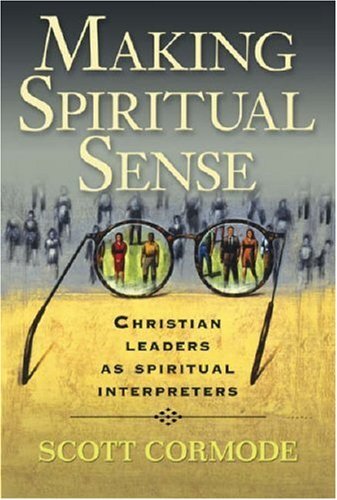Scott Cormode, Making Spiritual Sense: Christian Leaders as Spiritual Interpreters. Abingdon, 2006.
Referenced in:
LifeandLeadership.com Summary
This excellent text calls Christian leaders past organizational leadership to an identity of “the interpretive office,” helping people interpret everything in their lives from a Christian perspective and thus find meaning. He says, “The first duty of a Christian leader is to provide a Christian perspective, an interpretative framework for people who want to live faithful lives.” He finds biblical precedent in the roles of the prophets, Jesus (e.g. “you have heard…but I say unto you’), and the first Christian leaders.
Cormode integrates leadership gurus such as Max Depree that leaders “define reality,” Ron Heifetz’ insistence that leaders call people into the challenges of change, and Chris Argyris concepts of organizational learning. Yet he moves beyond these to affirm a unique role of pastors to inhabit the day-to-day existence and guide them into a Christian engagement of life’s issues.
He says when congregations face issues, they search their existing repertoire of meaning, “looking for the story that makes the most sense” (30) and “talking themselves into an interpretation of a given experience.” (24) These are their “pre-legitimated paths.” This presents an opportunity for pastors to “lead by providing God’s people with theological categories to make spiritual meaning.” (11) Thus, “every time a leader wants to create transforming change, that leader will have to initiate a legitimation process to help people make sense of the new reality.” (54)
Cormode describes two categories of resources that are available to leaders in this transformative work: “structural resources” (laws, money, workers) and “cultural resources” (ideas, values, purposes). He says, “Structural resources have the power to compel, while cultural resources have the power to persuade.” (67) Thus the cultural resources are more transformative. He highlights six of these resources that serve as the “building blocks of shared vision” – community, theology, norms, goals, narrative & ritual and practices. Each of these is examined in detail.
Cormode is rich in application, case studies, and strategic questions. One section that is especially helpful appears at the end where he applies the “interpretive office” of “making spiritual meaning” to the issue of money in the church. This is just one of the ways congregations heap unrealistic expectations on preachers that they will solve all historical problems with regard to church effectiveness. Eventually, all ministers will fail the people’s expectations, hopefully doing it as described by Ron Heifetz, “at a rate they can stand.” Yet the weight of these expectations, especially with regard to money, often causes great trepidation in ministers.
“Most pastors see money as the part of their job that takes them farthest from their calling as ministers of the gospel. Many report it is their most frustrating problem. They lament that dealing with money reduces them to a ‘company of shopkeepers’ hawking their wares. The worst meeting of the year is when the board debates the budget. And the most awkward sermons come at stewardship time. Pastors report that money questions uproot them from their calling to preach, teach, and counsel, instead entangling them in the administrative issues that they find least satisfying.” (117)
Cormode believes this is unfortunate, because since money is so close to the daily existence and even sleepless nights of members, it offers one of the most pregnant opportunities for making meaning. He says leaders should approach this task not from a position of frustration or avoidance, but strength. He offers eight guidelines for doing this in a way that integrates the insights from the book.
Among these eight guidelines, the first two steps make them “ready to discuss giving” and reframe their experience in spiritual terms. The first task is to provide a language that will help people be honest with God and each other. He says, “Christian leaders need to acknowledge the monetary pressures people experience and to encourage honest lament and complaint. People need an opportunity to express their anxieties before we can remind them that God has provided a world of abundance.” The second task is to provide a language to make sense of work. Work is a blessing for those who feel fulfilled and affirmed, or a curse for those whose inescapable work conditions discourage, dehumanize, or hurt them. This establishes that the leader is approaching his challenge to the people from a posture of sensitivity and identification.
From the Publisher
Everyone agrees that congregational leadership is important; few agree on exactly what it is. Some claim it has to do primarily with vision casting; others say it’s about effective administration; for others, serving as a change agent is most important. Yet all of these definitions forget that leadership in the church differs from leadership in other groups and organizations in one essential aspect: The congregational leader’s first calling is to help his or her parishioners see the world, and their place in it, through God’s eyes. God calls Christians to live transformed lives in a world in need of grace. God calls their leaders to help them adopt a set of perspectives, attitudes, and habits that make living as a Christian possible. This book will aid those leaders as they help Christians make spiritual sense of their lives.
About the Author
Scott Cormode is the Hugh De Pree Associate Professor of Leadership Development at Fuller Theological Seminary and the De Pree Leadership Center. He is an ordained Presbyterian minister and the founder of the Academy of Religious Leadership, and the Journal of Religious Leadership, plus the website, ChristianLeaders.org.
***For additional information on this resource, including reviews, click the bookstore links. Check the reference at page top or the links below for resource guides on related topics.***
Related Areas
See Other Resources on Leadership:
See Related Ministry Resource Guides:
- Change and Transition
- Church Administration
- Church Leadership and Renewal
- Conflict
- Elders, Plural-Elder Congregational Leadership
- Ministry Teams, Ministry Staff
See Resources on Over 100 Areas of Ministry Leadership:


